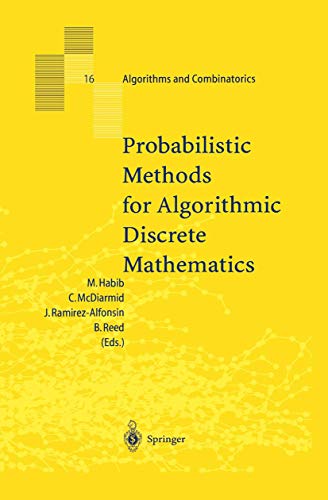Probabilistic Methods for Algorithmic Discrete Mathematics (Algorithms and Combinatorics, Band 16) - Softcover

Inhaltsangabe
Leave nothing to chance. This cliche embodies the common belief that ran domness has no place in carefully planned methodologies, every step should be spelled out, each i dotted and each t crossed. In discrete mathematics at least, nothing could be further from the truth. Introducing random choices into algorithms can improve their performance. The application of proba bilistic tools has led to the resolution of combinatorial problems which had resisted attack for decades. The chapters in this volume explore and celebrate this fact. Our intention was to bring together, for the first time, accessible discus sions of the disparate ways in which probabilistic ideas are enriching discrete mathematics. These discussions are aimed at mathematicians with a good combinatorial background but require only a passing acquaintance with the basic definitions in probability (e.g. expected value, conditional probability). A reader who already has a firm grasp on the area will be interested in the original research, novel syntheses, and discussions of ongoing developments scattered throughout the book. Some of the most convincing demonstrations of the power of these tech niques are randomized algorithms for estimating quantities which are hard to compute exactly. One example is the randomized algorithm of Dyer, Frieze and Kannan for estimating the volume of a polyhedron. To illustrate these techniques, we consider a simple related problem. Suppose S is some region of the unit square defined by a system of polynomial inequalities: Pi (x. y) ~ o.
Die Inhaltsangabe kann sich auf eine andere Ausgabe dieses Titels beziehen.
Von der hinteren Coverseite
The book gives an accessible account of modern pro- babilistic methods for analyzing combinatorial structures and algorithms. Each topic is approached in a didactic manner but the most recent developments are linked to the basic ma- terial. Extensive lists of references and a detailed index will make this a useful guide for graduate students and researchers. Special features included:
- a simple treatment of Talagrand inequalities and their applications
- an overview and many carefully worked out examples of the probabilistic analysis of combinatorial algorithms
- a discussion of the "exact simulation" algorithm (in the context of Markov Chain Monte Carlo Methods)
- a general method for finding asymptotically optimal or near optimal graph colouring, showing how the probabilistic method may be fine-tuned to explit the structure of the underlying graph
- a succinct treatment of randomized algorithms and derandomization techniques
„Über diesen Titel“ kann sich auf eine andere Ausgabe dieses Titels beziehen.
Weitere beliebte Ausgaben desselben Titels
Suchergebnisse für Probabilistic Methods for Algorithmic Discrete Mathematics...
PROBABILISTIC METHODS FOR ALGORITHMIC DISCRETE MATHEMATICS (ALGORITHMS AND COMBINATORICS ; 16)
Anbieter: Second Story Books, ABAA, Rockville, MD, USA
Softcover. Octavo, xvii, 323 pages. In Very Good condition. Spine is yellow with blue print. Illustrated: b&w figures. Series ISSN: 0937-5511. NOTE: Shelved in Netdesk Column G. 1379439. FP New Rockville Stock. Artikel-Nr. 1379439
Gebraucht kaufen
Versand innerhalb von USA
Anzahl: 1 verfügbar
Probabilistic Methods for Algorithmic Discrete Mathematics
Anbieter: moluna, Greven, Deutschland
Zustand: New. Artikel-Nr. 5047467
Neu kaufen
Versand von Deutschland nach USA
Anzahl: Mehr als 20 verfügbar
Probabilistic Methods for Algorithmic Discrete Mathematics
Anbieter: AHA-BUCH GmbH, Einbeck, Deutschland
Taschenbuch. Zustand: Neu. Druck auf Anfrage Neuware - Printed after ordering - Leave nothing to chance. This cliche embodies the common belief that ran domness has no place in carefully planned methodologies, every step should be spelled out, each i dotted and each t crossed. In discrete mathematics at least, nothing could be further from the truth. Introducing random choices into algorithms can improve their performance. The application of proba bilistic tools has led to the resolution of combinatorial problems which had resisted attack for decades. The chapters in this volume explore and celebrate this fact. Our intention was to bring together, for the first time, accessible discus sions of the disparate ways in which probabilistic ideas are enriching discrete mathematics. These discussions are aimed at mathematicians with a good combinatorial background but require only a passing acquaintance with the basic definitions in probability (e.g. expected value, conditional probability). A reader who already has a firm grasp on the area will be interested in the original research, novel syntheses, and discussions of ongoing developments scattered throughout the book. Some of the most convincing demonstrations of the power of these tech niques are randomized algorithms for estimating quantities which are hard to compute exactly. One example is the randomized algorithm of Dyer, Frieze and Kannan for estimating the volume of a polyhedron. To illustrate these techniques, we consider a simple related problem. Suppose S is some region of the unit square defined by a system of polynomial inequalities: Pi (x. y) ~ o. Artikel-Nr. 9783642084263
Neu kaufen
Versand von Deutschland nach USA
Anzahl: 1 verfügbar

